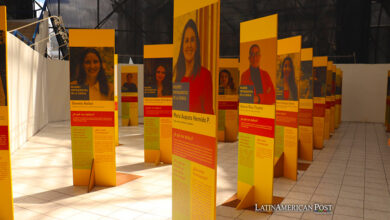Violations Of Religious Freedom Disproportionately Affect Women
Religious persecution has increased in 47 countries worldwide, many of which have religions that disproportionately affect women, demanding their conversion or subjecting them to sexual violence practices that affect your religious freedom.

The Woman Post | Ayda María Martínez Ipuz
Escucha este artículo
The Report on Religious Freedom (ILR), prepared by the pontifical foundation Aid to the Church in Need (ACN), recently presented globally, confirms that a significant portion of the world's population lives in countries where religious freedom is severely restricted.
Read more content like this at: thewomanpost.com
"There are countries where women have less dignity, face discrimination, and if they are Christian, they suffer double persecution. All countries with 'Sharia' (which enforces conversion) and all those with radical Islamist philosophies," stated María Lozano of Aid to the Church in Need (ACN) International.
Lozano explained that there are examples where women's rights are violated primarily due to religious reasons, such as in Pakistan and Nigeria, where women are experiencing terrorism and sexual abuse as a weapon of war.
The report, presented in countries like Paris, Berlin, Madrid, and Lisbon, points out that incidents of forced religious conversion, kidnappings, and sexual violence (including sexual slavery) have not decreased during the two years under examination. They continue to be largely ignored by local law enforcement agencies, as is the case in Pakistan, where young Christian and Hindu girls are often abducted and subjected to forced marriages.
Globally, over 4.9 billion people live in countries where religious freedom has been violated. There are 61 countries where citizens have faced severe violations in this regard.
Africa, the most violent continent.
You can also read: Fatima Amiri: The Day My Life Changed Forever
Africa remains the most violent continent, with an increase in jihadist attacks that further exacerbate the situation of religious freedom. Nearly half of the "hot countries" on the Report's map, 13 out of 28, are located in Africa, where female populations are the most affected.
The Report on Religious Freedom, published biennially since its first edition in 1999, is the only non-governmental report in the world that covers all countries without distinguishing between religions. It issues warnings regarding China and North Korea for having the worst record of human rights violations in Asia, including religious freedom, as these states exercise totalitarian control through surveillance and extreme repression measures against the population.
The report also pays special attention to India, where persecution levels have been increasing due to the imposition of dangerous ethnoreligious nationalism that harms religious minorities.
Risks for Young Muslims
Additionally, the report highlights the severe internal crises within Muslim communities worldwide. On the one hand, many young Muslims continue to be drawn to Islamist terrorist networks, but on the other hand, especially in the Middle East, there are signs of widespread secularization. For example, in Iran, surveys indicate that 47% of the population claimed to have no religious affiliation, and only 32% identified as Shia during the recent "hijab revolution" by Iranian women.
"I am now aware of the importance of discussing religious freedom as a fundamental right to ensure its protection, especially in a polarized society where violations committed against the freedom to profess religious beliefs are being swept under the rug," stated Sister Gloria Cecilia Narváez during the report's presentation. Sister Gloria is a Colombian missionary who was kidnapped and held captive by Islamist militants in Mali for four years and eight months.
"Through my missionary work in a Muslim environment and sharing a significant part of my captivity with a Muslim and a Protestant woman, I have learned that if we love, accept, and respect one another, we can live as brothers and sisters. Acceptance does not mean renouncing one's own beliefs, as true respect consists of listening, welcoming, and thanking each other for who they are," she emphasized in the report's preface.
"The methodology of the Report on Religious Freedom classifies countries into four levels: intolerance, discrimination, persecution, and genocide. Colombia is only at the level of intolerance, which does not involve, for example, discrimination in accessing public positions regardless of religious practice. Many countries are experiencing this, but not ours. Here, we can practice our faith and have access to an open society where we are free," commented María Inés Espinosa, Executive Director of ACN Colombia.




